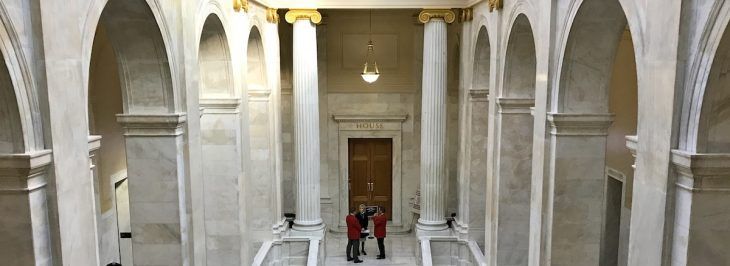House says no to banning marijuana edibles, yes to March primaries
by March 20, 2017 5:48 pm 579 views

The Arkansas House voted against banning manufactured edible medical marijuana products, voted to move party primaries permanently to March, and concurred in Senate amendments on a bill requiring voters to present a photo I.D. at the polls, sending that measure to the governor.
House Bill 1392 by Rep. Robin Lundstrum, R-Elm Springs, which would have banned commercially available edible marijuana products, failed after receiving a 52-40 majority. It needed 67 votes, a two-thirds majority, because it amended the constitutional amendment approved by voters in November.
Lundstrum said the marijuana amendment still allows users to access the drug in many forms, including by producing their own edibles. She said the state needs to move slowly in adopting marijuana as a medicine. Rep. Deborah Ferguson, D-West Memphis, said emergency room admissions related to marijuana are commonly the result of consuming too many edibles before the victim feels the effects.
In opposing the bill, Rep. Doug House, R-North Little Rock, who has sponsored much of the enabling legislation for the amendment, said many senior citizens prefer the edibles, which last longer and help sufferers from certain diseases sleep. He said commercially produced edible products are scientifically prepared with proper dosages. Rep. Tim Lemons, R-Cabot, said he had voted against the amendment but changed his opinion after his wife was diagnosed with cancer and saw that many patients will not be able to produce their own edible products.
Meanwhile, House members voted 73-10 with 9 voting present to move Arkansas’ party primaries permanently to the first Tuesday in March.
The sponsor of House Bill 1707, Rep. Michelle Gray, R-Melbourne, said the state’s moving its party primary to that date in March 2016 increased voter participation above 2012, when all primaries were in May, and 2008, when the presidential primary was in March while primaries for other offices were in May. Holding the primary in March enabled the state to participate in the so-called “SEC primary” early in the presidential nominating contest.
The bill moves the beginning of the fiscal session, which occurs in even-numbered years, to the second Wednesday in April.
Also, voters will have to present a photo I.D. or sign a sworn statement attesting to their identity when voting under House Bill 1047 by Rep. Mark Lowery, R-Maumelle. The bill now goes to the governor. Gov. Asa Hutchinson’s spokesman, J.R. Davis, said Hutchinson is generally in support of voter identification but would need to take a closer look at the bill.
The bill as originally passed by the House would have required voters to present a photo identification when voting or to vote provisionally and present an identification by the following Monday at noon.
Lowery amended the bill to allow the sworn statement based on discussions with the American Civil Liberties Union and a conservative election commissioner. That amendment was approved in the Senate and required concurrence in the House along with another amendment that made technical changes.
The Legislature in 2013 passed Act 595, which required voters to present a photo identification at the polls, but it was struck down by the Arkansas Supreme Court. The late Justice Donald Corbin wrote in his majority opinion that the measure added a qualification to voters that is not included in the Constitution. Justices Courtney Goodson, Karen Baker and Jo Hart, all of whom are still on the seven-member court, offered a concurring opinion based on the fact that the act was not passed with a two-thirds majority. They said that amount was required because the law changed a constitutional amendment, Amendment 51, which governs the registration of voters. They did not rule on the qualification issue.
Lowery has argued that the provisions will pass constitutional muster. However, legislators have already referred to voters during the November 2018 election a constitutional amendment that would require voters to present voter identification.
The House also voted against expunging House Bill 1726 by Rep. Dan Douglas, R-Bentonville, which would have created a 20-year highway bond issue that would have been funded by a 6.5-cent wholesale tax levied by a companion bill by Douglas. Voters would have been given the opportunity to approve the bond issue in the November 2018 election. Voting for expungement would give the bill a second chance to be considered. Needing a two-thirds majority, the vote was 61-24 with 1 present.
House members voted against House Bill 1575 by Lowery, which would require school districts to maintain net legal balances of no more than 20% of their annual revenues. Districts with larger balances would have five years to reduce those balances or lose state funding. Combined, school districts had net legal balances of $790.1 million at the end of 2016, an average of 19.75% of their revenues.
It initially passed 51-20 with 6 present. But opponents, needing to disqualify only one vote, instigated a parliamentary procedural maneuver called “sounding the ballot” where the Speaker of the House calls the roll, and if a legislator is not in his or her seat, the vote is stricken. Rep. Gary Deffenbaugh, R-Van Buren, was not present, meaning the bill failed. Lowery then requested that the vote be expunged, giving it a second chance to be considered.
House members also approved House Bill 2207 by Rep. Justin Boyd, R-Fort Smith, which amends the requirement that the University of Arkansas for Medical Sciences College of Medicine admit the first 70% of its freshman class divided among the state’s four congressional districts. Opponents said the bill would reduce opportunities and services in rural areas and could lead the school to accept more out-of-state students. The bill now goes to the Senate.
